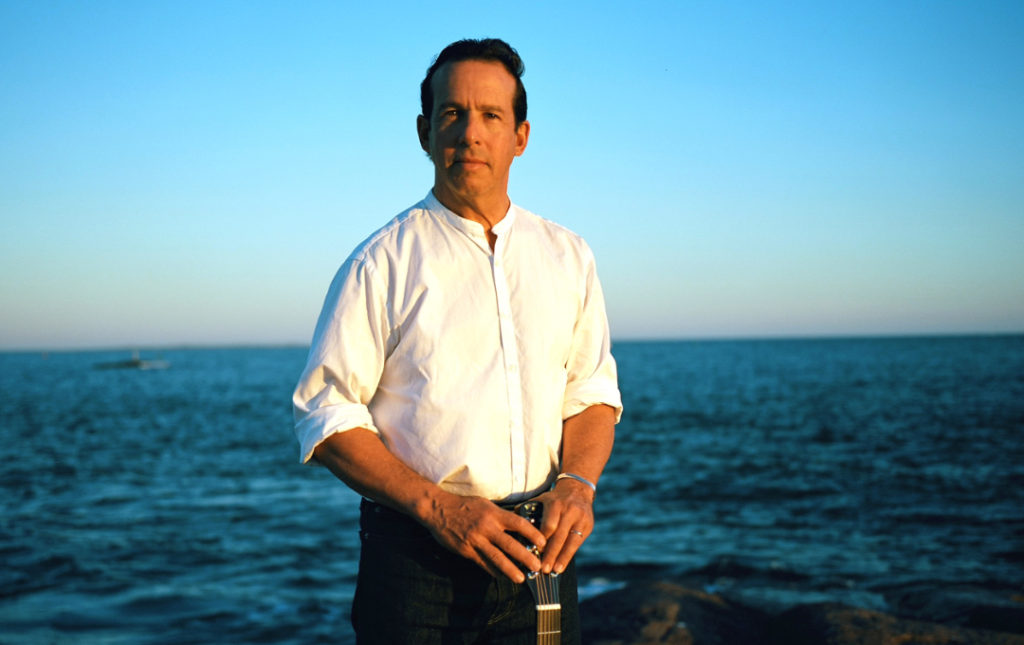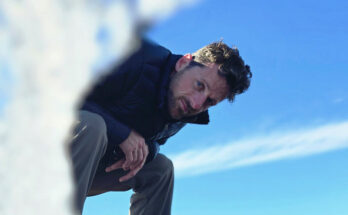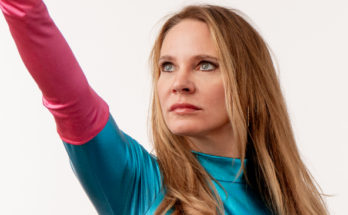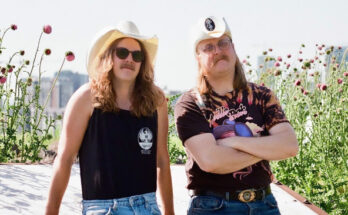 Boston-based Americana-folk rock singer/songwriter/guitarist Jonathan Paull Gertler is set to release his new album, No Fear, on September 10, 2021 via Rock Ridge Music. Co-produced by Gertler with his trusted collaborator Jon Chase at Chase Studios in Methuen, Massachusetts, No Fear further benefits from the intuitive collaborative nature of regular Gertler cohorts Sal DiFusco and John Paul on guitars, Joe Santerre on bass, and Jon Chase on percussion — not to mention the occasional, poignant cello accents from Catherine Bent and Bobby Chase, background vocals by Jon and Corinne Chase, and piano courtesy of Doug Johnson.
Boston-based Americana-folk rock singer/songwriter/guitarist Jonathan Paull Gertler is set to release his new album, No Fear, on September 10, 2021 via Rock Ridge Music. Co-produced by Gertler with his trusted collaborator Jon Chase at Chase Studios in Methuen, Massachusetts, No Fear further benefits from the intuitive collaborative nature of regular Gertler cohorts Sal DiFusco and John Paul on guitars, Joe Santerre on bass, and Jon Chase on percussion — not to mention the occasional, poignant cello accents from Catherine Bent and Bobby Chase, background vocals by Jon and Corinne Chase, and piano courtesy of Doug Johnson.
“The idea was to go for less sonic density and understated quality, something I think helps the listener get much closer to the music,” says Gertler of the intentional simplicity of No Fear. “Over the course of three albums, my sound has been an evolution of diminishing production density and increasingly organic feeling. I hope the simpler it gets, the better it gets. When you say less but express more, the song stays central.”
Listen to the album here.
Whether it’s the clear acoustic shimmer of the optimistic opening track, “Grasp the Moon,” the stark emotionality of “Time and Place,” the jaunty lilt of “Low Lying Sun,” the vibrant resonator counterbalance that permeates “Just Another Day,” or the swingshift shuffle of the title track, No Fear cascades with the creative momentum of an artist fully in control of steering the course of his musical destiny.
The first single from the album, “Time and Place,” a heartfelt requiem inspired by the untimely passing of Gertler’s sister, was released on July 9th and it premiered earlier that week at Americana Highways, who urged listeners to, “Enjoy the peace that Jonathan Paull Gertler bestows through his songwriting.” The second single, “I Wish I Knew,” is set for release on August 20th. Says Gertler about the song, “‘I Wish I Knew” is one of two tunes I have written for electric guitar. As with many of the songs, this one was written to say that we all have many conflicting challenges. Recognizing them and learning from them makes us better in the long run.” “I Wish I Knew” will premiere at Adobe & Teardrops on August 18th.
Keeping things as raw and real as Gertler does so adroitly throughout No Fear bonds him even more tightly to his listeners. Said emotion-driven intentions readily come across in Gertler’s inclusive, conversational vocal style, something that enables him to invite listeners to join him on the ride at hand. “If you can be a person who draws people in sincerely and you never violate that trust, life is fuller,” he explains. “I recognize I’m somewhat extroverted, and I’m usually willing to put my emotions out there. Connecting with people directly is something I find very gratifying — and I tried to do that with No Fear.”
While growing up in New York City, the fire of creativity stirred inside Gertler at an early age. He began learning guitar at the age of 11 from a music teacher who taught him folk and blues songs, which heavily influenced his songwriting. “Right from the very first time I picked up a guitar, I started writing songs,” he reports. “I started writing seriously when I was about 14 or 15, and it never occurred to me not to be engaged fully in my chosen subject matter.” A fan of melodies, stories, grit, and songs with emotional depth, Gertler gravitated toward and found himself influenced and inspired by performers such as Chris Smither, Bonnie Raitt, Paul Simon, Joni Mitchell, Stephen Stills, Jason Isbell, Lyle Lovett, Karla Bonoff, and Ryan Montbleu.
While music was always important to him, he waited until he had some life lessons and experience under his belt before he released his music into the world. 2013’s After the Storm and 2016’s Heart and Mind were fueled by a culture of positivity, filled with the persistent optimism he has always had and tempered by the appreciation of challenge and risk that years can bring. “Everything I’ve ever been involved with has to reflect that,” he believes. “There are certain subjects that are very powerful and inspiring as a songwriter. Things like love and reflection and nature all hopefully find their way into my lyrics, but you also have to take into account all the pitfalls the world can bring you. My songs are more observational than experiential but all writers draw from their own emotional make up in their observations.”
Gertler feels the many years he spent as a vascular surgeon clearly fueled his outlook as a songwriter. “Being a surgeon was a central event in my life,” he agrees. “It informs your personality, and I spent a lot of early and formative years at it. I was exposed to aspects of life, death, and other things most people never get to see or help with. Some of my songs are very reflective of that part of my personality, and accordingly I also try to account for the willingness to take risks in life to get to a better place without putting people in harm’s way. If you’re afraid of taking that risk, you can end up with poor outcomes.” The art of surgery is very much the art of staring down tough odds with both confidence and humility.

Exclusive Q&A from Jonathan Paull Gertler about the album and his music
This album is magical, start to finish, and the songs fit together so well. Can you walk us through how you came to gather this collection of songs into one living, breathing album?
Those are incredibly kind words, and I am truly appreciative. I am very mindful of trying to draw from different styles – not because I have any albums planned out in advance necessarily but because it keeps me interested and musically inquisitive and fresh. For example, all the albums have had a deeply jazz or swing influenced tune – the first album had “Never Been Easy” and “Poor You” (with arcane chord changes); Heart and Mind had “Ease on Down;” this album has “No Fear” – and in writing the next group, I have a tune titled “The Best of Times” that is straight out of the American songbook. I write in open tunings a good deal but try not to have that be a dominant mode (though it was close to the majority on Heart and Mind). And I love the surprises of a minor fourth and the simplicity of finger-style guitar. So I try for all of these elements as I write and find that sometimes a pure jazz tune in one setting moves to a different style using similar chord changes but with just the switch of meter or lyrical inspiration.
This album was about the themes of resilience and bravery (which is not to say being foolish) as the unifying ideas. And the next songs that are either done or are in process have an approach to even greater chord change simplicity and clearly have the unifying theme of what the world and all of us personally have been through over the last 18 months.
So I guess it’s not planned, but as I write over a one- to two-year period, inevitably the tunes are linked because I have whatever is current going through my head, and the observations I can turn into songs then have a relation or flow. As long as the melodies and meters are varied, I am hopeful it can work.
Your sound is laced with Americana, folk, and roots rock.. We have readers that we are introducing to your music for the first time here. How do you describe your music and your sound?
Nice to think I have a sound! I always try to make the songs melodic but to have surprises in the chords. Truthfully, the thing I struggle with most is ensuring the beat doesn’t stay the same – and lyrically that there is a turn of phrase that also surprises. I like irony and warmth, and the natural world always provides some inspiration (and my grown children make fun of me horribly for the references to tides and planets and water and whatever they can make fun of). I grew up loving folk and southern rock, never found punk or metal appealing, still think that roots country is great, and also think the classic American songbook canon is something we should all cherish. Jazz and blues are true American arts, and though I never got the feel for syncopated improvisation, the chord surprises that jazz contains and also the wonderful changes of the American songbook all have influenced me. So I am sure I am a fusion of everything I have ever heard, but if I have a sound it is probably rooted in the surprise minor and the open tuning.
Related to the last question, where do you pull your musical inspirations from? Who are some of your favorite artists and musicians and how have they impacted you as a musician and lyricist?
After a lifetime of writing that started with the most basic folk chord patterns and migrated through complexity and back, I find myself trying to simplify more and more. This also means simpler, tighter lyrics – I am very much inspired by the perspective one gets after living through tumult and the progress of life and also am always optimistic despite some recognition that we as a species could be doing much better. But my inspiration lyrically and situationally comes from those perspectives and emotions, often catalyzed by a turn of phrase in a book or the spoken word, and often oriented to either an observed situation or just metaphorically made into some sort of love song. Musically, my inspirations are from everything as described above ranging from Carly Simon to Steven Sondheim and there’s even a Bach prelude thrown into the first album. For emulation or inspiration, I always think of great songwriters. Paul Simon has to be up there – he started with traditional folk and has moved us through different cultural channels; Jason Isbell, with his incredible depth of lyric and melody based off simplicity itself; Ryan Montbleu knocked me over with his percussive finger-style on YouTube long before anyone knew who he really was and what he could do (he’s also a master of the solo live show); Carly Simon; Chris Smither; musicals; Ella and Louis; etc. All are relevant and all are incorporated in different ways. And I just rediscovered Joni Mitchell’s Blue. Forgot how brilliant it is. And I have to mention Nanci Griffith’s Love at the Five and Dime, which, when I listened to it again after her recent death, really moved me extraordinarily. I had forgotten how much the simplicity, romance, and good values influenced me.
Your lyrics have a lot of depth to them, with different lines having impact on repeated listens, sort of a peel-back-the-layers kind of experience the more time one spends with the songs. What is your writing process? Where do you tend to get your best ideas from? How long do you tend to work on individual songs? Do you write regularly?
I jot down (well, voice memo, really) ideas all the time. Lyrical ideas, captured phrases, chord combinations, and sometimes they fall together. I find the more I get to play, the more the writing comes easily. But not surprisingly, rarely will the voice memos really work. I think of them more as little bits of scattered light or energy, and then usually something hits and a full song comes out. It’s always very rough (well, almost always; “Time and Place” was a 15-minute write that required very little change). But if I can capture a set of chords and phrases, I will then just iterate for a few weeks until it is right. The meter will change, as might the time signature. The lyrics always get refined. But I find if the song presents itself in full, even if really flawed, it is way better than the piecemeal ideas.
I have had one melodic phrase and lyrics around, however, for decades. I always loved it. And never made it part of anything. I just wrote a tune in May that begged it as the bridge, and after decades I found a home for this morsel. So not everything I said in the first paragraph is true, I guess.
I love polychords – which can happen in open tuning or in regular tuning. And as said, I love the unexpected minor modulation. If my voice is shot because of a cold or too much voice abuse, I can’t write. I need to be able to sing to have the lyrics come out. The lyrics and progressions almost always have to come together.
I am making this out to be way more methodical than it is. Better way to say it is that I play as much as I can, ideas form, and then I find something and work it ’til it’s right. Fifteen minutes to decades, I guess.
Talk a little bit about the impact that your original hometown (NYC) and your current hometown (Boston) have had on your music. How have the places you’ve lived influenced your music?
I grew up on the heels of the Greenwich Village folk scene with an older sister who introduced me initially to the music – Dylan, Laura Nyro, Joni Mitchell, etc. – but it rapidly became me seeing bands at the Schaefer Music Festival (Jefferson Airplane, Ike and Tina Turner, John Sebastian), Dead concerts, and starting to go to the Fillmore East (Hendrix, Allmans etc.). So the sound of the ’60s bands and the protest of the ’60s, even if I was a little young to really participate, were embedded early. And New York sensibilities from that era are hard to lose, though I am now clearly made of New England stuff with a side of NY.
Boston is a place where contribution to the world and intellect are rewarded, where the greater good is part of the fabric of life, and nature is always within a 60-minute drive from a vibrant city filled with different ideas, cultures, and a European smallness that allows you to just walk and think. Great place to be.


